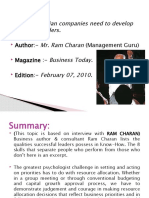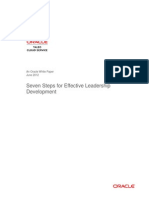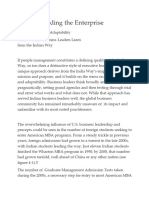In Pursuit of A CEO
In Pursuit of A CEO
Uploaded by
kshitij_131285Copyright:
Available Formats
In Pursuit of A CEO
In Pursuit of A CEO
Uploaded by
kshitij_131285Original Description:
Original Title
Copyright
Available Formats
Share this document
Did you find this document useful?
Is this content inappropriate?
Copyright:
Available Formats
In Pursuit of A CEO
In Pursuit of A CEO
Uploaded by
kshitij_131285Copyright:
Available Formats
In Pursuit of a CEO
What is the responsibility of the Board of Directors in selection of the right CEO?
Tharuma Rajah
India is now an engine for growth for many global organizations, whether they are top manufacturing companies or providers of outsourced business processes. Global corporations are investing in the country, transferring or building operations, establishing service centers and finding new partners to merge with or acquire. With its educated, hard-working population and entrepreneurial spirit, India is an exciting and thriving place to do business. But is the country living up to its promise? You would agree with me, the success - or otherwise - of India Inc. is dependent on the nature and skill of its business leaders and CEOs. RESPONSIBILITY RESTS WITH THE BOARD The choice of a chief executive is probably the single most important decision any board will make. Given the high stakes, the price to be paid for making the wrong choice can be staggering. India's Best Boards are not only demanding a significant role in the CEO selection process, but they are also looking for tools that equip them with rigor in this critical decision. Ironically, while many boards retain top strategy consultants to review corporate strategy plans, investment bankers to review acquisitions, and adopt many other rigorous processes in their decision-making, in the board's most important decision - the selection of top corporate leadership - rigorous processes have been notably lacking. So what are the expectations from India's Best Boards? We find that they are using a range of leading-edge practices with respect to CEO selection that are helping them make the best possible choice when it comes to it. ROLLING UP THE SLEEVES Boards typically recognize that the first step in a CEO selection process is gaining agreement on a job description for the future CEO. They also know that industry experience and a clear track record in addressing relevant strategic challenges are important. But there is often more to defining the demands of the CEO role than what is immediately apparent. A business in the midst of a dire turnaround places distinct demands on CEO capability in contrast to the demands of a CEO of a financially sound business requiring long-term growth. In Hay Group's experience, we have found that it is particularly useful for Boards to understand and act upon the key competencies that make a CEO effective in India's volatile environment. This provides the board with insights on key capabilities and characteristics that are both objective and research-based as input into fleshing out the profile for their new CEO. WHO IS THE INDIAN CEO? Under the aegis of India's Public Enterprises Selection Board (the body that is responsible for
choosing CEOs and top executives for India's public sector enterprises), Hay Group and Bharat Petroleum conducted research with a view to identify the competencies required of 'The Indian CEO'. In the process, we undertook in-depth interviews with 32 CEOs across India's public and private sector, as well as consulted with more than 50 experts from the government and academia. The results of our research - which were published in a book titled 'The Indian CEO: A portrait of excellence' - helped in creating an understanding for better CEO selection and development, and also work as a guide for Boards to consult with during the process. The best CEOs in India have four unique qualities, which are unlike those found in similarly excellent business leaders globally. SINGLE-MINDED FOCUS ON GROWTH The best Indian CEOs focus almost exclusively on issues directly related to business growth: turnarounds, launching new products or operations, or improving their existing businesses. This was in clear contrast to our international sample, which focused as often on other matters (reorganizations, internal politics, succession, public image, etc.). WORKING TO MAKE INDIA GREAT The best Indian CEOs exhibit a strong and consistent concern for the country's welfare, be it as an argument that they make to others, or as the thinking behind some of their most difficult or risky decisions. Although leaders in other countries have shown various kinds of social responsibility, Indian CEOs were unique in their focus on the country. ADAPTING IDEAS AND TECHNOLOGY TO INDIAN CONDITIONS The most high-performing Indian CEOs are able to consistently describe how they adapt or modify technologies and business practices learned abroad to better serve India, or to take the best advantage of the local materials and markets. Sounds familiar, doesn't it? ENTREPRENEURSHIP: ADDRESSING THE LOWER HALF OF THE ECONOMIC PYRAMID In the most successful stories of Indian CEOs, they generally focused on providing quality goods and services for the middle and lower parts of the economic pyramid, be it through online farming data, trucks or tractors adapted to the Indian roads and fields, reliable watches, or salt that would retain iodine under Indian cooking conditions. This strategy is driven by a combination of good business sense and the leaders' focus on improving conditions in India. WHERE DO WE GO FROM HERE? As company boards start to take a far more hands-on approach to CEO selection, the competencies identified by our research (as showed in Table 1: The Indian CEO's Competency Model) will help those at the helm make better decisions. This model, developed as an outcome of the research, lists the strengths of the best Indian CEOs into 11 competencies, which are thematically grouped into four clusters. This model entails detailed discussions with the full board about specific capabilities that will be required for future leadership, in light of the company's strategy and business model. It also requires them to undertake efforts to constructively gauge the capabilities of internal executive talent against these competencies; ensuring that comprehensive plans are put into place to develop internal talent. With the findings of this research in hand, boards now have the potential to make better person-to-job matches for CEO positions by providing greater clarity on just what kind of a CEO
is needed for different challenging business situations in India. In turn, this will help in focusing leadership development internally as well. WHERE THERE'S A WILL Failed CEO selection decisions destroy shareholder value, deplete employee morale and embarrass the board that made the "bad decision," are only a few of the negative outcomes. India's Best Boards are intent on reducing that risk not only by making CEO selection and succession a key item on the board agenda, but by bringing a level of rigor to the process that provides the level of due diligence shareholders deserve and will increasingly come to expect, after all, it is the board's most critical decision. The author is Regional Managing Director ASEAN, India, Pacific, Middle East and Africa, Hay Group
Tharuma Rajah
Article View
You might also like
- 18 Key Leadership Competencies For 2023 SuccessDocument29 pages18 Key Leadership Competencies For 2023 SuccesspritiNo ratings yet
- Field Practice 2Document17 pagesField Practice 2Lea Jane Laurete Calledo83% (6)
- CSIS Manual v2019.Document111 pagesCSIS Manual v2019.nurse2012100% (1)
- Succession Planning in Senior ManagementDocument9 pagesSuccession Planning in Senior ManagementTracey MorinNo ratings yet
- Minerich Strategy LeadershipDocument4 pagesMinerich Strategy LeadershipSowmya MadaNo ratings yet
- Itc Hotels - CaseDocument11 pagesItc Hotels - Casekshitij_131285No ratings yet
- Digital Learning Compass: Distance Education Enrollment 2017Document39 pagesDigital Learning Compass: Distance Education Enrollment 2017Robby ZulhammaNo ratings yet
- The Essence of Military Group Cohesion: Disputatio Sine FineDocument10 pagesThe Essence of Military Group Cohesion: Disputatio Sine FineSergio Fabian LizarazoNo ratings yet
- Human Resource Management: Submitted By-Varun Garg 28NMP46Document6 pagesHuman Resource Management: Submitted By-Varun Garg 28NMP46KumarVelivelaNo ratings yet
- The Indian CEO - A Portrait of ExcellenceDocument16 pagesThe Indian CEO - A Portrait of ExcellenceEhtesham Ali KhanNo ratings yet
- Mwo PresentationDocument15 pagesMwo PresentationSakshamNo ratings yet
- Global Leadership Forecast 2018 - India Report - Ddi - TRDocument66 pagesGlobal Leadership Forecast 2018 - India Report - Ddi - TRMayankJhaNo ratings yet
- DevelopingFutureLeaders PDFDocument25 pagesDevelopingFutureLeaders PDFRobinNo ratings yet
- Determinants of Business Excellence A STDocument56 pagesDeterminants of Business Excellence A STFtu NGUYỄN THỊ NGỌC MINHNo ratings yet
- Module 2Document19 pagesModule 2mahasinprodhan822No ratings yet
- 7 Factors Determining The Internal Environment of A BusinessDocument9 pages7 Factors Determining The Internal Environment of A Businessimransodangi6No ratings yet
- Indian Companies Need To Develop Pool of Leaders. Mr. Ram Charan Business Today. February 07, 2010Document5 pagesIndian Companies Need To Develop Pool of Leaders. Mr. Ram Charan Business Today. February 07, 2010baniya007No ratings yet
- Seven Steps For Effective Leadership Development: An Oracle White Paper June 2012Document23 pagesSeven Steps For Effective Leadership Development: An Oracle White Paper June 2012Srinathvr100% (1)
- MB0052 - Strategic Management and Business PolicyDocument16 pagesMB0052 - Strategic Management and Business PolicyBhanu PratapNo ratings yet
- 2012 Bersin Global Leadership Developing Tomorrows LeadersDocument42 pages2012 Bersin Global Leadership Developing Tomorrows LeadersVahmi Brian Owen D'sullivansevenfoldimerzNo ratings yet
- Stretegic PurposeDocument55 pagesStretegic PurposenpradeekaNo ratings yet
- Question 3 (15 Marks)Document7 pagesQuestion 3 (15 Marks)nickcrokNo ratings yet
- Leadership DevelopmentDocument19 pagesLeadership DevelopmentSmiti AgarwalNo ratings yet
- Indian Way of Doing BusinessDocument9 pagesIndian Way of Doing BusinessAstha PatelNo ratings yet
- HR Talent Scape - Aon Hewitt ReportDocument40 pagesHR Talent Scape - Aon Hewitt Reportsrik27100% (1)
- Case AnalysisDocument3 pagesCase Analysisjhunjhun vellaNo ratings yet
- A Study On HRM Practices and Its Impact On Globalisation of Indian BusinessDocument3 pagesA Study On HRM Practices and Its Impact On Globalisation of Indian BusinessInternational Organization of Scientific Research (IOSR)No ratings yet
- Strategic Management and Business PolicyDocument6 pagesStrategic Management and Business PolicyBrandon WarrenNo ratings yet
- Leadership Development ASSIGNMENT02Document20 pagesLeadership Development ASSIGNMENT02Nadeesh IlukkumbureNo ratings yet
- Q1. Advise The Start Up On The Following (5 Marks Each) 1) Rational of Esops For Startups and As A Retention Strategy. AnswerDocument30 pagesQ1. Advise The Start Up On The Following (5 Marks Each) 1) Rational of Esops For Startups and As A Retention Strategy. AnswernickcrokNo ratings yet
- Company ProfileDocument18 pagesCompany ProfileKunwar ChaudharyNo ratings yet
- Primer For Building An Effective Board For Growing Startup CompaniesDocument9 pagesPrimer For Building An Effective Board For Growing Startup CompaniesThe Ewing Marion Kauffman FoundationNo ratings yet
- Role of Board of Directors in The Indian Corporate Governance StructureDocument18 pagesRole of Board of Directors in The Indian Corporate Governance Structurenandhana madhuNo ratings yet
- HRM TalentDocument14 pagesHRM TalentArpit BajajNo ratings yet
- 2 - Leadership LessonsDocument15 pages2 - Leadership LessonsTripdayzNo ratings yet
- Dokumen - Tips - HR Practices at HulDocument48 pagesDokumen - Tips - HR Practices at HulKashish barjatyaNo ratings yet
- Strategic Leadership and HR ManagementDocument12 pagesStrategic Leadership and HR ManagementNayeem UKNo ratings yet
- Leadership StrategyDocument28 pagesLeadership StrategyAbdullah Sani Bin Haji Abdul Salleh100% (1)
- Performance Appraisal System of HDFCDocument69 pagesPerformance Appraisal System of HDFCn_walia83261050% (2)
- Case 2 Axis BankDocument5 pagesCase 2 Axis BankDeepak NagwanshiNo ratings yet
- Leadership StrategyDocument28 pagesLeadership StrategyAdrian Morales AraujoNo ratings yet
- NanoTool-2023-03-Choosing A New Board LeaderDocument3 pagesNanoTool-2023-03-Choosing A New Board LeaderrpercorNo ratings yet
- Group-7 (Sec-A) PDFDocument12 pagesGroup-7 (Sec-A) PDFPuneet KakkarNo ratings yet
- India’s_Best_Companies_To_Work_For_2024Document36 pagesIndia’s_Best_Companies_To_Work_For_2024Akash JoshiNo ratings yet
- India's Best Companies To Work For 2024Document36 pagesIndia's Best Companies To Work For 2024Diksha PatilNo ratings yet
- Role of Strategic Managemnt-Strategic ManagementDocument5 pagesRole of Strategic Managemnt-Strategic Managementrohan_jangid8No ratings yet
- Leadership and Its Effects On Employees PerformanceDocument76 pagesLeadership and Its Effects On Employees PerformanceZulfiquarAhmed100% (1)
- Strategy Implementation Staffing and DirectingDocument45 pagesStrategy Implementation Staffing and Directing언니은리No ratings yet
- CGBE AssignmentDocument5 pagesCGBE AssignmentHimanshu GoenkaNo ratings yet
- Leadership PapersDocument6 pagesLeadership PapersSoeronoxNo ratings yet
- Deliverable 7Document11 pagesDeliverable 7assignmentsacerNo ratings yet
- Fundamentals of Business Management: Continuous Assessment 2Document12 pagesFundamentals of Business Management: Continuous Assessment 2Osama bin LadenNo ratings yet
- Ahmadi 2020Document21 pagesAhmadi 2020Chandra Wijaya WNo ratings yet
- Lesson 0 HRMDocument5 pagesLesson 0 HRMpaulaNo ratings yet
- Leadership StrategyDocument21 pagesLeadership StrategyCynthia Maltese Fowler100% (1)
- Week 11 DiscussionDocument2 pagesWeek 11 DiscussionduncanNo ratings yet
- (Outstanding) (DDI) 9 Talent Management Best Practices - DDIDocument12 pages(Outstanding) (DDI) 9 Talent Management Best Practices - DDINguyen Thanh-LoanNo ratings yet
- Corporate Governance Report On Reliance (Trupti)Document23 pagesCorporate Governance Report On Reliance (Trupti)Niraj Desai0% (1)
- Do You Know Who Your Next CEO IsDocument13 pagesDo You Know Who Your Next CEO IsYour HR BuddyNo ratings yet
- The Path To SustainabilityDocument2 pagesThe Path To SustainabilityNeha PareekNo ratings yet
- Project ReportDocument7 pagesProject Report9873032511100% (3)
- Best Strategies for a Company to Progress!From EverandBest Strategies for a Company to Progress!Rating: 5 out of 5 stars5/5 (1)
- Focus Forward Leadership: Maximizing Profits in the Artificial Intelligence AgeFrom EverandFocus Forward Leadership: Maximizing Profits in the Artificial Intelligence AgeNo ratings yet
- The Basic Knowledge for COO: The hidden key to becoming a best leader: a guide for ambitious leadersFrom EverandThe Basic Knowledge for COO: The hidden key to becoming a best leader: a guide for ambitious leadersNo ratings yet
- Marico Ltd.Document16 pagesMarico Ltd.Mitali ParekhNo ratings yet
- How To Crack CAT PapersDocument1 pageHow To Crack CAT Paperskshitij_131285No ratings yet
- ITM - Malad Smba 16: Group MembersDocument16 pagesITM - Malad Smba 16: Group Memberskshitij_131285No ratings yet
- Tax Efiling ProjectDocument48 pagesTax Efiling ProjectTeena ChaudhariNo ratings yet
- University Lecturer Cover Letter - JobHeroDocument3 pagesUniversity Lecturer Cover Letter - JobHeroOzden IsbilirNo ratings yet
- A Mediated Model of Employee Commitment: The Impact of Knowledge Management Practices On Organizational OutcomesDocument15 pagesA Mediated Model of Employee Commitment: The Impact of Knowledge Management Practices On Organizational OutcomesMonika GuptaNo ratings yet
- Thesis Grad ChulaDocument8 pagesThesis Grad Chulakriscundiffevansville100% (2)
- Thesis For M.tech ElectricalDocument7 pagesThesis For M.tech Electricalzidhelvcf100% (2)
- Master Thesis Internet MarketingDocument8 pagesMaster Thesis Internet Marketingdeanavillanuevabridgeport100% (1)
- CORRELATION OF COVID Chapter 1-3Document30 pagesCORRELATION OF COVID Chapter 1-3Ira Dela Rosa100% (1)
- Research On Moya Food ComplexDocument78 pagesResearch On Moya Food Complexthitna100% (1)
- Grade 7 Study Guide About Paraphrase, Summary and PrécisDocument10 pagesGrade 7 Study Guide About Paraphrase, Summary and PrécisMARK FERNANDEZNo ratings yet
- RES 511-LectureDocument19 pagesRES 511-LectureAbdifatah mohamedNo ratings yet
- 16 12 2023 Formate For SynopsisDocument5 pages16 12 2023 Formate For Synopsisविकास राजपूतNo ratings yet
- Metpen Sosiolinguistik PDFDocument184 pagesMetpen Sosiolinguistik PDFeka srirejeki iriantinNo ratings yet
- Analytic MemoDocument4 pagesAnalytic MemojokazelNo ratings yet
- Chapter-I-V GroupIV Roger453Document46 pagesChapter-I-V GroupIV Roger453mecarosmilaNo ratings yet
- Coon Dissertation 2015 PDFDocument406 pagesCoon Dissertation 2015 PDFкирилл кичигинNo ratings yet
- An Investigation On The Role Played by Ict in Improving Teaching For Secondary Schools. A Case Study at Tanganyika Secondary School by Abuubakari Salumu ChimbavalaDocument56 pagesAn Investigation On The Role Played by Ict in Improving Teaching For Secondary Schools. A Case Study at Tanganyika Secondary School by Abuubakari Salumu ChimbavalaAlmin de ClassicNo ratings yet
- Online GamesDocument6 pagesOnline GamesnoneNo ratings yet
- Zarah PRDocument30 pagesZarah PRSkep TenorioNo ratings yet
- Jurassic Park ThesisDocument4 pagesJurassic Park ThesisValerie Felton100% (2)
- CSTP 1 Engaging and Supporting All Students in Learning Evidence 1Document2 pagesCSTP 1 Engaging and Supporting All Students in Learning Evidence 1api-534241952No ratings yet
- The Professional Attitude of Faculty Members2020Document60 pagesThe Professional Attitude of Faculty Members2020Justeen BalcortaNo ratings yet
- Forensic Psychology Dissertation ExamplesDocument8 pagesForensic Psychology Dissertation ExamplesBuyALiteratureReviewPaperHuntsville100% (1)
- UCSP l2Document17 pagesUCSP l2Daphney JaralveNo ratings yet
- Bigo - Pierre Bourdieu and IRDocument34 pagesBigo - Pierre Bourdieu and IRAna Maria VazquezNo ratings yet
- TACL Users Guide PDFDocument24 pagesTACL Users Guide PDFChanna LiNo ratings yet
- Introduction To Educational Administration and Planning: Adepoju O.JosephDocument88 pagesIntroduction To Educational Administration and Planning: Adepoju O.JosephShakil AhmadNo ratings yet





























































































